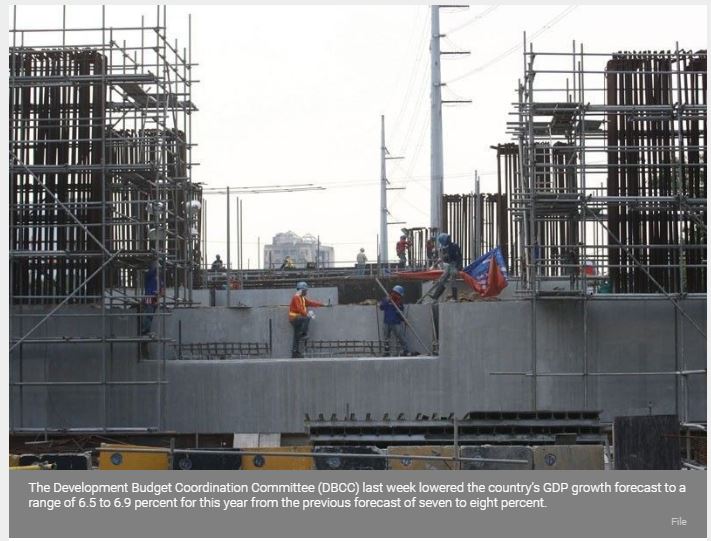Philippines: Downward adjustment in growth targets too optimistic
MANILA, Philippines — The recent downward adjustment made by the Philippine government in the economic growth forecast for this year is still too conservative considering the challenges faced by the economy, according to London-based Capital Economics.
The Development Budget Coordination Committee (DBCC) last week lowered the country’s GDP growth forecast to a range of 6.5 to 6.9 percent for this year from the previous forecast of seven to eight percent.
The government, however, maintained the growth forecast of seven to eight percent for 2019.
According to Capital Economics, this “was merely a case of bowing to the inevitable given the poor performance of the economy in the first half of the year.”
“Given the headwinds facing the economy in terms of high inflation, rising interest rates, weaker global demand and political uncertainty, this forecast appears way too optimistic,” the macroeconomic research firm said in a brief issued over the weekend.
Capital Economics, thus, retains its Philippine growth projection of 6.3 percent for this year, slowing to six percent in 2019.
The DBCC also raised the inflation forecasts for this year to a range of 4.8 to 5.2 percent, and three to four percent in 2019.
Meanwhile, the inflation forecasts from 2020 to 2022 have been retained at a range of two to four percent.
This is consistent with the government’s assessment that inflation will go back to the target level by next year.
In order to fund its ambitious infrastructure plans the government is targeting a budget deficit of three percent of GDP next year – which would be the second biggest since the global financial crisis.
Capital Economics noted, however, that if economic growth and government revenues come in significantly below target, the deficit would widen markedly.
“Government debt is currently just over 40 percent of GDP – which is low by its own historical standards and relative to other Asian countries. As a result, a fiscal crisis is not imminent. But if the deficit continues to widen, questions may start to be raised about the government’s commitment to a responsible fiscal policy,” it said in the brief.
The DBCC expects revenue collections to reach P2.82 trillion in 2018, equivalent to 16.1 percent of GDP with the Tax Reform for Acceleration and Inclusion (TRAIN) contributing P63.3 billion. This is slightly lower than the original P2.85 trillion revenue program for 2018 with the deferred implementation of E-receipts and fuel marking under TRAIN.
Economic managers have also urged Congress to pass the succeeding packages of the Comprehensive Tax Reform Program (CTRP) to “put in place a simpler, fairer, and more efficient tax regime while financing the country’s development priorities.”
Tax collections may also be reduced with the proposed suspension of the next increase in fuel excise tax to tame inflation. The National Economic and Development Authority said, however, that lost revenue from this may be offset by higher value added tax collection.
For 2019, DBCC said the deficit target would then be expanded to 3.2 percent of GDP in order to fund priority projects of the government, particularly infrastructure and investments in human capital development. The deficit target will then be brought back to three percent GDP in 2020 until 2022.
Source: https://www.philstar.com/business/2018/10/22/1861989/downward-adjustment-growth-targets-too-optimistic#c0Wb418C7Cj5vkdj.99


 English
English




